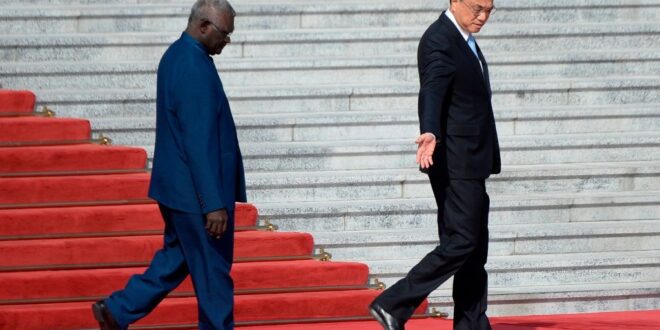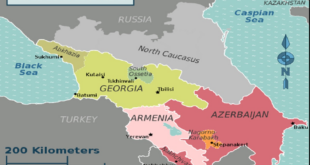All the Pacific Island nations invited to the foreign ministerial conference had already embraced Beijing’s “One China Policy.” Some of these states once had diplomatic links with Taiwan but were wooed away by Beijing’s offer of financial loans, investment and corrupt practices, such as direct interference in the domestic political affairs that threaten the sovereignty of governmental institutions in these island countries.
The Chinese Communist Party (CCP) is accelerating its campaign to isolate Taiwan from the existing international order by offering bribes to leadership figures in some of these poor islands, in exchange for breaking with Taipei.
A Council on Foreign Relations report from May 4, 2022, “What the China-Solomon Islands Pact Means for the US,” states: “Beijing promised about $730 million in financial aid.”
[D]omination of the Pacific seems to mean to the CCP potential military control over, or vassalage of, not only to Taiwan, but also Japan, Australia, Korea, the Philippines, Indonesia, India and the US — in Guam, American Samoa, Micronesia, Northern Mariana, Palau, the Marshall Islands, and Hawai’i.Chinese Communist Party strategists would doubtless welcome agreements with any Pacific island to permit a Chinese military base or offers of a dual-use port facility for China’s growing navy. If Chinese warships could gain greater access to island state port facilities, China’s naval assets would be able to interrupt free passage in international waters of US naval vessels and others, both in major commercial sea lanes as well as military supply routes throughout the region.
The Marshall Islands provides the US with an opportunity to shut down an ongoing example of China’s accelerating effort to project power and influence and into the South Pacific.
The Communist Chinese government has offered to create artificial islands for Tuvalu…. Despite the appeal of this offer, Tuvalu rejected the proposal. Tuvalu’s Prime Minister Kausea Natano instead proposed a cooperative compact with all those Pacific island states that still maintain ties to Taiwan.
Last October, China convened, via video link, the first foreign ministerial conference with nine Pacific Island states: Micronesia, Fiji, Kiribati, Niue, Papua New Guinea, Samoa, the Solomon Islands, Tonga, and Vanuatu.
The Chinese quickly followed up this initiative on December 3, 2021, by establishing “The China-Pacific Island Countries Reserve of Emergency Supplies” — an arrangement that the Chinese Provincial Government of Guangdong has with the Pacific Island countries that in the event of a public health emergency or natural disaster, China will provide needed medical supplies.
China’s diplomatic offensive in the South Pacific reveals yet another effort to replace the US as the primary superpower in the region. All the Pacific Island nations invited to the foreign ministerial conference had already embraced Beijing’s “One China Policy.” Some of these states once had diplomatic links with Taiwan but were wooed away by Beijing’s offer of financial loans, investment and corrupt practices, such as direct interference in the domestic political affairs that threaten the sovereignty of governmental institutions — such as the Ministry of Foreign Affairs, the Ministry of Commerce, and the Solomon Islands’ election process — in these island countries.
While the People’s Republic of China has not yet established a formal pro-China organization to rival the pro-Western Pacific Island Forum initiated in 1971, the challenge to the US is clear. The Chinese Communist Party (CCP) is accelerating its campaign to isolate Taiwan from the existing international order by offering bribes to leadership figures in some of these poor islands, in exchange for breaking with Taipei.
In the case of the Solomon Islands, Prime Minister Manasseh Sogavare’s pro-Beijing sentiments led to an influx of Chinese nationals who were accused by the islanders of taking jobs from the natives. Following riots in in late 2021, regional countries, such as Australia, New Zealand, Papa New Guinea, and Fiji, dispatched soldiers and police there, and helped restore order. As Gatestone reported in January 2022:
"World attention was drawn to this region in early November when several days of riotous burning which consumed sections of the capital city of Honiara on the island of Guadalcanal in the Solomon Islands. There are several causes of the unrest, including decades-old ethnic tensions among the Melanesian, Polynesian, Micronesian and Chinese citizenry. Another is the existence of bitter political partisanship within the archipelago state. This internal rivalry is personified by the government of Prime Minister Manasseh Sogavare from the island of Guadalcanal and his chief opponent Daniel Suidan, from the Island of Malaita. Sogavare survived a no-confidence vote, earlier this month following the riots.
"The immediate cause of the recent disturbances is the perception among many Solomon Islands natives of the corrupt influence of huge sums of money dispensed by Communist China, which has accounted for massive interference in the domestic politics of the Solomons. Suidan claims that PRC agents in 2019 offered PM Sogavare a $100 million loan to switch allegiance from Taiwan, with which the Solomons had diplomatic ties for 36 years, to Communist China. Suidan also alleges that Mainland operatives have provided computers and cars to other lesser politicians. The anger of the protesters focused on Honiara's Chinatown, where many buildings were gutted by incendiaries"A Council on Foreign Relations report from May 4, 2022, “What the China-Solomon Islands Pact Means for the US,” states:
"Beijing promised about $730 million in financial aid. The move triggered violent anti-government unrest in the Solomon Islands that killed four people and prompted China to offer anti-riot gear and send a team of six police liaison officers to equip and train Solomon Islands police."Presently, only 15 nations have formal diplomatic relations with Taiwan, and four of them are in the South Pacific: the Marshall Islands, Nauru, Palau, and Tuvalu.
While the Pacific island states are small and the combined population of these states approximates a mere 2.3 million, these island states are “scattered across an area equivalent to 15% of the globe’s surface.” China’s incentives to increase its influence in the Pacific region, are both strategic and economic. The South Pacific contains some of the world’s best endowed fishing regions. The Chinese fishing fleet, with nearly 17,000 boats, is the world’s largest. China captures about 20% of the world’s catch and consumes about 40% of its seafood. According to the Council on Foreign Relations:
"China's direct investment in Pacific Island countries rose from $900 million in 2013 to $4.5 billion in 2018, a 400 percent increase. Chinese companies invested more than $2 billion in Pacific mining over the past two decades. Additionally, China has expressed strong interests in the regions' fisheries, aquaculture, harbor construction, and other related areas. From 2010 to 2020, total trade in fishery products between China and the Pacific Islands increased from $35 million to $112 million. By the end of that period, eleven Chinese enterprises had invested in the fisheries industry across six Pacific Island countries."More than that, domination of the Pacific seems to mean to the China potential military control over, or vassalage of, not only to Taiwan, but also Japan, Australia, Korea, the Philippines, Indonesia, India and the US — in Guam, American Samoa, Micronesia, Northern Mariana, Palau, the Marshall Islands, and Hawai’i.
Chinese Communist Party strategists would doubtless welcome agreements with any Pacific island to permit a Chinese military base or offers of a dual-use port facility for China’s growing navy. If Chinese warships could gain greater access to island state port facilities, China’s naval assets would be able to interrupt free passage in international waters of US naval vessels and others, both in major commercial sea lanes as well as military supply routes throughout the region.
Militarily, China’s People’s Liberation (PLA) Air and Naval forces could leapfrog over the first and second so-called “string of pearls,” coastal island chains in the South China Sea and the Indian Ocean, thereby challenging any effort by the Free World to restrict the Chinese from setting out its warships into the open ocean.
Chinese expansionism in the Pacific, left unchecked, would certainly doom any US effort to establish a QUAD nation (India, Japan, Australia, and the United States) defense perimeter against China in the Pacific Ocean.
According to a report from the IISS:
"China's involvement in money politics in the Solomon Islands has mushroomed since Honiara switched its diplomatic recognition from Taiwan to China, in 2019. Local media have alleged that payments were made from a Chinese development fund to Solomon Islander politicians who voted down a recent no-confidence motion against the prime minister."Meanwhile, in April, the Solomon Islands agreed to a security pact with China, which is now expected to establish a naval base there which could potential threaten all the islands in the region, including Hawai’i.
Kirabati is another Pacific Island state that severed relations with Taiwan in 2019. Current President Taneti Maamau was elected in the 2018 national elections on a pro-PRC platform. The Chinese have promised to refurbish the Canton Island Airstrip which served as an allied heavy bomber base against Japan in WWII. If China rebuilds the air strip, the Chinese could spy on US Pacific fleet exercises, mobilization, and operations. The enhanced Chinese presence could also render US Missile and Space Tracking operations on the island to closer scrutiny.
Fiji witnessed an aggressive example of Chinese “Wolf Diplomacy” when Red Chinese diplomats showed up unannounced at a celebration honoring Taiwan’s 109th National Day on October 8. 2020. The ensuing melée resulted in the hospitalization of an injured Taiwanese trade representative. Although Fiji recognizes Beijing’s “One China Policy” and has formal diplomatic ties with China, it has not protected the island state from being humiliated by Chinese warrior diplomats, who physically assaulted Taiwan’s officials at an event hosted by Fiji’s government.
Aggressive comportment by PRC diplomats, demonstrating its contempt for Pacific Island State sovereignty, also was in evidence in Papua New Guinea’s (PNG) hosting of the Asia Pacific Economic Cooperation (APEC) summit in November 2018. The Chinese delegation demanded a private audience with PNG’s Foreign Minister. When the delegation was instructed that this would violate APEC regulations on transparency, the diplomats attempted to break into the PNG Foreign Minister’s office.
China’s bullying tactics against Pacific Island countries’ sovereignty extends to the maritime dimension as well.
Palau, which is an archipelago state of about 340 coral islands and atolls, and the last member of “US Trusteeship Territories” in the Pacific Ocean, became independent in 1994. Palau entered into a “Compact of Free Association” with the US, which stipulates that America is responsible for the island’s defense until 2044. Despite this proviso, last December, Chinese fishing vessels entered illegally into Palau’s maritime economic zone prompting Palau’s Coast Guard to seize two boats. Palau, which still maintains links with Taiwan, rejected China’s offer to finance a giant fish processing plant on its territory.
Vanuatu, which has had relations with China since 1982, was also beset Chinese fishing violations of its maritime economic zone. Two Chinese boats, the Dong Gong 13 and Dong Gong 16, were seized close to Australian sovereign waters. The Chinese fishermen were then temporarily detained in the country’s capital, Port Vila. Rumors persist in Vanuatu that the Chinese plan to transform a remote wharf in Luganville on the island of “Espiritu Sancto” into a military base.
China is also exploiting “Climate Change” fears in the South Pacific where many islands have low-lying topography. The Communist Chinese government has offered to create artificial islands for Tuvalu. The highest point on the country’s nine islands is only 4.5 meters above sea level. Despite the appeal of this offer, Tuvalu rejected the proposal. Tuvalu’s Prime Minister Kausea Natano instead proposed a cooperative compact with all those Pacific island states that still maintain ties to Taiwan.
Nauru, a Pacific Island state with a population of only about 12, 000, also had the prudence to reject a Chinese proposal. China, under the rubric of CCP General Secretary Xi Jinping’s “One Belt and Road” initiative, offered to improve the country’s poor communications infrastructure by laying undersea communications cables. Instead, Nauru kept its ties to Taiwan and asked the Asian Development Bank and Australia to assist it in developing of the project.
The Marshall Islands provides the US with an opportunity to shut down an ongoing example of China’s accelerating effort to project power and influence into the South Pacific. The US “Compact of Free Association” with the Marshall Islands is soon up for renewal. Marshall Island leaders are lobbying for an upgrade of the agreement. They are hoping to elicit from a resistant State Department a few billion dollars from “Uncle Sam” to compensate islanders for health and environmental depredations as a result of nuclear waste storage on one of its islands, as well as for the ill effects of years of atomic testing in the region. The US also has aerospace facilities and intelligence collection nodes there. Several Congressmen in November of 2021 dispatched a letter of concern to US National Security Advisor Jake Sullivan regarding the dispute: it appears that hundreds of Marshallese still have adverse health conditions attributable to the atomic blasts. Some Congressional representatives have proffered a “Blue Pacific Act,” which has bipartisan support from the House of Representatives’ (first ever) Pacific Islands Caucus. The Act would protect US military, economic, and strategic interests in the entire South Pacific region and expand diplomatic and non-defense related humanitarian aid programs between the US and all of the Pacific island states.
 Eurasia Press & News
Eurasia Press & News




